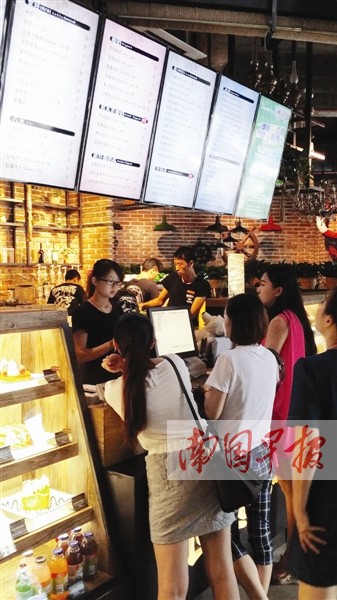The price of coffee beans is soaring all the way. Yongcheng Cafe encounters the dilemma of "you play with beans".

Drinking coffee in cafes has become a leisure way for many citizens.
Guangxi News Network-South Morning Post reporter Liao Minwen / photo
Coffee drinkers may have to increase their consumer spending in the near future. Since the beginning of this year, Brazil, the world's largest coffee producer, has experienced severe drought and high temperatures, which has significantly reduced coffee production, driving up international coffee prices. As of June 9, ICE Arabica coffee futures had risen nearly 70 per cent. People in the Yongcheng coffee industry said that the "beans you play" market has begun to affect the domestic market, and some local coffee shops also plan to adjust their prices in the near future.
1 some coffee shops in the market plan to raise prices
In response to the global rise in raw materials caused by reduced production of coffee beans in Brazil, the food giant has begun to raise the price of finished coffee. According to media reports, in early June, Kraft Foods and J.M.Smucker Co, the largest maker of bagged coffee in the United States, successively announced that they would increase the retail price of their coffee products by about 10% on average. Whether the domestic chain brands of coffee will take any action or not will be concerned by consumers.
"We have received notice of the price increase from Jiejia headquarters, and from July, the prices of a series of products including coffee and tea will increase by more than 20%." Liu Yuedong, general manager of Nanning Jiejia Coffee Co., Ltd., said that rental costs and labor costs have continued to rise in recent years, and if coupled with the rise in raw material prices, the pressure on operators can be imagined, especially in chain coffee shops with large consumption of coffee beans. Jiejia coffee shops in Guangxi will also adjust their prices at the same time, but taking into account the acceptance of consumers, they will take a more moderate approach. For example, the price of a single cup of coffee remains the same, but the price of a refill increases.
Affected by the international market, the purchase price of coffee beans in Yunnan has also risen sharply since the beginning of this year. At the end of last year, the purchase price of coffee raw materials in Yunnan was only about 14 yuan / kg, but now it has risen to about 25 yuan / kg, an increase of nearly 80%. " Mr. Chen, head of the coffee and milk tea chain with four branches in Nanning, said that he also plans to adjust the price of coffee in the store at the end of June and early July, but not all kinds of coffee and caffeinated drinks will rise across the board. and adopt the way of launching new products and special drinks to play down the impact of the price increase on consumers.
The reporter also contacted the relevant responsible persons of Starbucks, McDonald's McCoffee, China Resources Pacific Coffee and other international well-known coffee brands, and were told that they had not received any notice of price increase for the time being. However, some people in the industry predict that the price of "big brands" is also very likely to rise this year.
2 the wholesale price of coffee beans has risen by about 25%
Data show that Brazil's coffee bean production accounts for 40% of the global coffee production. A number of Yongcheng industry insiders pointed out that the reduction in coffee bean production in Brazil will certainly have an impact on the downstream market. In addition to chain cafes, the impact of individual stores has been inevitable. Since the beginning of this year, the wholesale price of coffee beans on the market has generally risen by more than 25%.
According to Ms. Huang, an industry insider, in fact, the main supply market for Brazilian coffee beans is not China. At home, coffee beans from Southeast Asia occupy a considerable market share. However, when there is a serious reduction in coffee production in Brazil, demand for coffee beans from other producing areas will rise because of scarcity, thus having a linkage effect on global coffee bean prices. At present, many chain coffee giants have formed their own raw material planting and supply bases, which have a greater ability to resist the rise in coffee bean prices. On the other hand, individual store operators, who mainly wholesale coffee beans on the market, are actually more affected.
"there is a big gap between the purchase price of coffee beans and the wholesale price, and the 25% increase in the wholesale price of coffee beans is not a small proportion." Ms. Huang said that the wholesale price of coffee beans with a purchase price of 14 yuan / kg will rise to about 40 yuan / kg after initial processing, packaging, logistics and other links. The wholesale price increases by 25%, which is equivalent to an increase in the cost of 10 yuan / kg.
According to incomplete statistics of people in the industry, there are currently about 500 cafes, large and small, in Nanning, with individual stores accounting for more than 60%. Judging from the reporter's visit, the single store operator is quite hesitant on the issue of whether to respond to the price increase. Mr. Wei, head of a coffee shop in Nanning, said that small coffee shops tend to have a relatively fixed and limited customer base. However, due to the increasing number of small coffee shops in recent years, the competition between each other is also quite fierce, "the price increase is worried about losing regular customers, and if the price is not raised, profits can only be reduced, which is a difficult choice for operators."
Important Notice :
前街咖啡 FrontStreet Coffee has moved to new addredd:
FrontStreet Coffee Address: 315,Donghua East Road,GuangZhou
Tel:020 38364473
- Prev

ICE raw sugar futures were almost unchanged on June 20, while Arabica coffee futures rose.
ICE cocoa futures have fallen from nearly three-year highs hit this week, while raw sugar futures have barely changed.
- Next

Coffee becomes the mainstream instead of tea South Korea actively promotes the development of domestic tea industry
South Korea's coffee imports surged 13.6% from January to May this year, reaching 52660 tons, Yonhap news agency said, citing data released by South Korea's Agricultural and Aquatic Food Circulation Corporation (aT) on the 22nd.
Related
- What brand of black coffee is the most authentic and delicious? what are the characteristics of the flavor of the authentic Rose Summer Black Coffee?
- Introduction to the principle and characteristics of the correct use of mocha pot A detailed course of mocha pot brewing coffee is described in five steps.
- Which is better, decaf or regular coffee? how is decaf made?
- How much is a bag of four cat coffee?
- How about four Cat Coffee or Nestle Coffee? why is it a cheap scam?
- Which is better, Yunnan four Cats Coffee or Nestle Coffee? How about cat coffee? is it a fake scam? why is it so cheap?
- How about Cat Coffee? what grade is a hoax? which instant coffee tastes better, four Cat Coffee, Nestle Coffee or G7 coffee?
- Process flow chart of coffee making-Starbucks coffee making process what coffee tastes good at Starbucks
- The top ten best coffee beans in the world Rose summer coffee or Tanzanian coffee tastes good
- Yunnan four cat coffee is good to drink?_four cat coffee is a big brand? four cat blue mountain coffee is fake?

